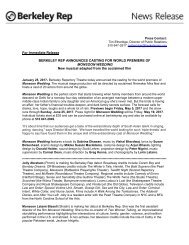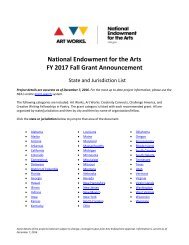BERKELEY
program-ic
program-ic
Create successful ePaper yourself
Turn your PDF publications into a flip-book with our unique Google optimized e-Paper software.
PROLOGUE<br />
from the Artistic Director<br />
Imagine you’re reading a letter from me that<br />
names a specific politician who is running for President.<br />
Imagine me describing the tactics that person is using to<br />
re-define the American political landscape: tactics such as<br />
inciting terror and hate-mongering and bullying the opposition.<br />
I can’t do that, of course. I work for a not-for-profit organization<br />
that is forbidden, by law, to take political positions.<br />
(Except, of course, in the work we produce and the culture<br />
we create.) As artistic director, I can’t go public with any of<br />
my personal political opinions because it might be interpreted<br />
as the “views of the organization.” Which would be bad. Very bad indeed.<br />
But there’s nothing to stop you from imagining my opinion. After all, you came<br />
to see It Can’t Happen Here, our adaptation of Sinclair Lewis’ famous novel published<br />
in 1935. Lewis, for his part, was a student of history and American political pathology.<br />
He was paying attention to the populist appeal of Huey Long and zealous followers<br />
of Father Coughlin. He studied capitalism, understood its commitment to inequality<br />
and the fundamental disconnect between our economic system and democracy. He<br />
saw the appeal of fascism in Italy and Germany and tried to imagine an American<br />
counterpart. The novel ends up combining real history with melodrama, romance,<br />
and satire to create a story that seems both fantastical and true, impossible to believe<br />
and yet shockingly on point.<br />
The parallels to our own time are quite real. Demagogues, then and now it<br />
seems, have remarkably similar strategies. They wrap themselves in the guise of “authenticity,”<br />
taking on personas as truth tellers whose speech is riddled with vitriolic<br />
sloganeering and furious hectoring to turn their constituents into avenging furies.<br />
But Lewis makes it clear that the personality of the demagogue is not the real issue;<br />
poverty, fear, and ignorance are what make us vulnerable to authoritarianism, and his<br />
larger vision of America is breathtakingly relevant on a host of levels.<br />
And so here we are. Doing a play that feels like something more than a play.<br />
About fictional events that Lewis described over 80 years ago that suddenly feel like<br />
a warning to those of us living today. A warning that we take nothing for granted.<br />
That we learn from our history as we try to embrace the present struggle. And as you<br />
watch, I trust you will form your own opinion on these matters, since our lives and future<br />
are dependent on the outcome of debates that are currently raging in our streets.<br />
As for my own opinion, grab me the next time you see me if you want further<br />
explication. But don’t ask me to predict the future. Hell, I thought George McGovern<br />
was going to beat Richard Nixon in ’72.<br />
Sincerely,<br />
Tony Taccone<br />
2016–17 · ISSUE 1 · THE <strong>BERKELEY</strong> REP MAGAZINE · 5




